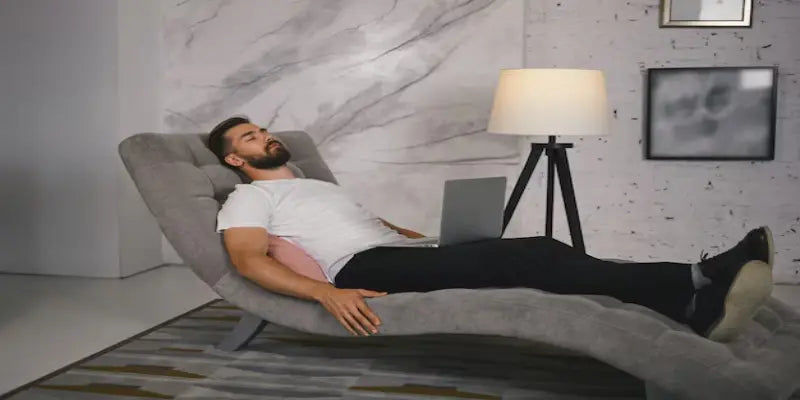
Common Couple Sleeping Positions & What They Mean
Every couple has a unique sleep position they love to sleep in while some couples are too touchy others like their own space. Whether you're spooning, facing away from each other, or sprawled across the bed, your sleeping position reveals a lot about our relationships.
In this blog, we’ll explore some common couple sleeping positions and what they may reveal about the emotional and psychological aspects of your relationship.
Spooning Position (The Classic Cuddle)

One of the classic sleeping positions is spooning in which one person curls up behind the other, making a shape like two spoons stacked together. If you and your partner sleep in a spooning position that means there is a lot of trust and emotional connection in your relationship.
There are two variations of the spooning position:
Loose spoon:
In a loose spoon sleeping position, both the partners face in the same direction while maintaining some distance between them. This position allows for comfort while still maintaining intimacy. The distance between partners in loose spooning position is not sign of any trouble between the couple but it shows that they have neutered the deeper commitment stage in their relationship.
Chasing spoon:
In chasing spoon position sleep, one partner sleeps on their side a few inches away from the other partner, while the other partner faces their direction without touching them. Although it is not proven,it is said that those who sleep in this position may have some trouble in their relationship. The big spoon slippers to chase the little spoon which seems like the big spoon is interested in the relationship while the other person is feeling distant.
The “Back-to-Back” (Non-Touching)

In this position, you both sleep with your backs to each other. There’s no physical contact, but you’re still close. This position shows that your relationship is in a good place emotionally, with both partners feeling secure even without constant closeness.
If you are one of those couples who value their personal space, even in a close relationship, non-touching back-to-back is the perfect sleeping position for you. This suggests emotional maturity and respect for each other’s space.
The “Back-to-Back” (Touching)

In this position, you and your partner sleep back-to-back while remaining in touch, also known as cherish position. This position is often seen in couples who have been together for less than a year, going through their honeymoon phase. This position is one of the most relaxing positions as both partners maintain clones throughout the night.
The “Face-to-Face” (With Contact)
In this position, you and your partner are facing each other, heads at the same level. You may be barely touching or completely entwined, with your limbs wrapped or draped over one another.

Couples who sleep face to face have a strong emotional bond and love expressing their thoughts and feelings. This position implies good communication, with partners feeling comfortable talking and being honest with one another. However, sleeping face-to-face is not the best approach to get decent sleep because either of you may grow uncomfortable with the other's breath in your face.
The “Face-to-Face” (Without Contact)

In this position, you and your partner are facing each other but without touching. This position allows you to roam around while still seeing each other and feeling connected. This position could be interpreted as pillow discussion, in which you face one other and open out emotionally, which is a positive sign.
However, this position is more likely to signal interpersonal troubles. You may both require attention from the other but have been unable to resolve or explain this. Communicate your needs to your spouse. Actively listen when they express their emotions and feelings.
The “Starfish” (Sprawled Across the Bed)

In this position, one partner extends out across the bed, taking up a lot of space. The second person could be curled up or pushed to the edge. In this posture, one partner appears to be more dominant than the other, since they take up more space. It is probable that the other partner will feel uncomfortable and frustrated due to the lack of space when sleeping.
It could also signify that the person is comfortable and confident in the relationship, and they make modifications since one of the partners requires extra space when sleeping.
The “Cradle” (Holding Your Partner)

In the cradle position, one spouse sleeps close to the other, arms wrapped about them. When most couples go to bed, they start in this posture but eventually transition to a more comfortable sleeping position.
The partner practicing the cradling may have a deep desire to protect the other physically and emotionally. Like spooning position sleep, this posture conveys warmth and connection, with the cradler feeling protective and caring.
The “Freefall” (One Partner on Stomach, Arms Spread)

In this position, one spouse sleeps in a more neutral position, while the other sleeps on their stomach with their arms outstretched. Similar to the back-to-back position, this one demonstrates that both partners are emotionally confident in their relationship while also being at ease with a certain amount of personal space.
The freefall stance frequently implies that one spouse enjoys feeling assertive or in charge of their life. It can imply weakness or the need to emotionally defend oneself, even if it could appear to be a position of authority.
Both on Stomach

In this position, both partners sleep on their stomach. Most often, couples who sleep on their stomachs without touching each other do so out of dread. This could be a fear of losing a career, one's health, or anything else, really, not just the relationship itself.
Sleeping facedown may also indicate a lack of trust in the relationship because it protects the body. It's not very healthy to sleep on your stomach. This position may affect your quality of sleep on an individual basis as well. It puts additional strain on the spine, resulting in back pain. To properly correct your spine, place a pillow beneath your stomach if you still enjoy sleeping in this position.
Cliffhangers

When both individuals are laying on opposite sides of the bed, far apart, they are doing the cliffhanger. Perhaps there was a fight or argument between you recently. When a relationship breaks down, it's seen to be appropriate to take some time apart to relax and decompress.
There is also a useful reason for sleeping in the cliffhanger position. For couples who sleep hot or in hot situations, this position is probably the greatest temperature choice.
Leg Hug

A second passionate position is the leg hug. Whether your feet touch every now and then or your legs are completely interlaced, this position invites intimacy. If you're both doing it, that's a positive indicator. However, if only one person enjoys leg hugs, the partnership may be slightly imbalanced.
If one person's leg or foot are contacting their partner, it may indicate a desire for a sexual or emotional connection. A pair of twisted legs indicates that your lives are intertwined and that you exist as a whole.
Pillow Replacement

You or your partner are using the other person's arm as a pillow. One of you may be lying on your stomach, arm outstretched, while your partner's head rests on your arm. This position is gentle and compassionate, yet you may awaken with a sore neck or arm numbness at night.
This position indicates that you and your partner mutually support and rely on one another. This pose demonstrates that you are literally reaching out to each other. However, the person serving as the pillow should ensure that they are not sacrificing their own comfort for their companion.
Fetal Pair

In this position, both lovers sleep in the fetal position, curled up like babies. However, sleeping too long or too firmly in this position might cause lower back pain. If you enjoy sleeping in the fetal position, insert a pillow between your knees to relieve pressure on your body.
This position may imply that you have unsolved issues in your relationship or feel estranged from each other. Take measures to address any conflicts in your relationship. If you notice your spouse is pulling away and you're not sure why, ask them how they're feeling and how you can help.
Pet Barrier

You and your spouse might like having your dog, cat, or other furry creature join you in bed. Your pet may sleep with you or cuddled between your feet. Sleeping with dogs has also been linked to improved immune and mental health.
Partners may also feel constrained when sharing a bed with their pet, particularly if the animal is huge or sleeps with their body extended out. Additionally, the animal's early morning awakenings to be let out or fed may disrupt both spouses' sleep.
Toy Soldiers

In the toy soldier position, both of you lie flat on your backs. Your hands are parallel to your bodies and do not contact in any way, like two toy soldiers lying side by side. This is not only a bad position for hugging or snuggling, but it is also an uncomfortable sleeping position.
This position could indicate independence in your partnership or that you both sleep in your preferred position, independent of your relationship status.
Benefits of Sleeping With a Partner
While sharing a bed can be intimate and romantic, there are some major benefits to sleeping together, too. There are many health benefits such as lowering your blood pressure, reducing inflammation and strengthening your immune system.
Your body releases serotonin, also referred to as the "happy chemical," and dopamine, which, when released in big amounts, helps you experience pleasure, when you spend each night sleeping with the person you love. Therefore, sharing a bed actually makes you happier.
When you're alone, it's easy to become lost in your own thoughts. And we've all been there: being buried in your thoughts can lead to overthinking. When you sleep with a partner, you're less likely to become preoccupied with your inner thoughts and are more likely to relax and go to sleep.
Sleeping together allows you to spend quality time with your partner, whether it's talking about your day, reading, or doing something else. Spending time in bed with someone you love and are attracted to can help you get better sleep. Being physically close to the person you love causes your brain to release oxytocin, the "love hormone," and serotonin, the "happy hormone."
Cons of Sleeping with a Partner
Sleeping with your partner has many advantages, but it also has many disadvantages. Many people decide to share a bed with their partner. While sleeping with a partner may be an act of intimacy in the early stages of a relationship, it can have an impact on relationship health.
A few ways one person can disrupt another's sleep are:
- Loud snoring
- Excessive movement or tossing and turning in bed
- Different temperature preferences
- Different sleep patterns or schedules
- Children or pets sleeping in the bed with you
Some people find it easy to sleep alone in the bed and it doesn’t mean that the couple is having some problems. It is just that they want to prioritize their sleep more.
How to Get Better Sleep With Your Partner
Nobody likes waking up frustrated because their partner could let them sleep peacefully at night. There are ways you can sleep better with your partner. Always communicate your preference to your partner and be open about it. Try different sleeping positions to see what works best for you and your partner. Some positions that may work well include back to back, face to face, or the leg hug.
If your partner tosses and turns, a new or larger mattress may help. You can also invest in memory foam pillows which help you and your partner get better support and comfort. If you're having trouble sleeping next to your partner, you might want to try sleeping in separate beds.







